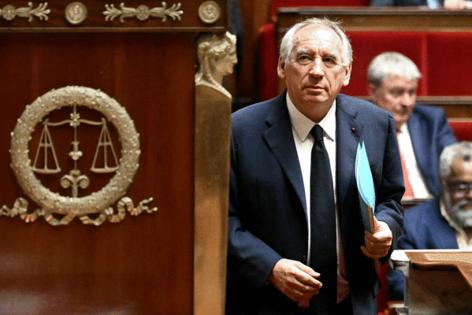French government on verge of collapse over budget
Published in News & Features
PARIS — Prime Minister Francois Bayrou’s government will likely fall Monday, a victim of his push to chip away at France’s massive debt load.
Bayrou will face a confidence motion in France’s lower house, a vote he called in a bid to pressure lawmakers to back his budget proposals. He said over the weekend that it was needed as a “clarification.”
His plan may have backfired, however, as opposition parties in the National Assembly have mobilized against Bayrou’s minority government.
“There are moments when we need a rude shock,” Bayrou told France 5 television on Saturday. “There’s never been a situation as blindingly clear as this one.”
Bayrou will make a policy speech starting at 3 p.m. Paris time, followed by interventions by the political groups in the National Assembly. The vote will take place in the evening, with the result expected between 8 p.m. and 9 p.m.
Here’s what you need to know as the confidence motion unfolds and beyond:
Why did Bayrou call a confidence motion?
The premier called the vote to rally lawmaker support for his plan to narrow France’s 2026 deficit to 4.6% of economic output from an expected 5.4% this year. That plan includes €44 billion ($51.6 billion) of spending cuts and tax hikes.
He also floated an unpopular proposal to cut two public holidays as a way to reduce costs in Europe’s second-largest economy.
France’s fiscal deficit is now the widest in the euro area. Debt is rising by €5,000 ($5,840) a second, and the cost of servicing it is set to hit €75 billion next year, according to the government.
What happens if the government falls?
For Bayrou to survive, he needs to get the approval of a majority of those votes cast. Given that the groups that support the government represent just 210 seats out of 574 currently occupied (there are three vacant seats at the moment), Bayrou would need well over 100 abstentions in order to survive, assuming all members of those parties that support the government vote in his favor.
If Bayrou loses the vote, President Emmanuel Macron’s options include naming a new premier or dissolving the lower house and calling early elections, which aides have said is not in the plans for now. Macron has repeatedly insisted he wouldn’t resign, as some parties have demanded.
If Macron were to name a new prime minister, it would leave unanswered the question of how the government passes an unpopular budget, which brought down the previous premier, Michel Barnier, last year.
The context underscores the sudden return of France’s fiscal concerns to the forefront of investors’ attention at a time when European neighbors such as Italy are making comparative progress in taming deficits.
How are markets reacting?
Since Macron shocked France by calling a snap election in June 2024, creating the current stalemate, the CAC 40 has fallen 4.1%, compared with a 4.9% gain for the Stoxx Europe 600 Index and a 24% rise in Germany’s DAX Index excluding dividends.
A collapse of Bayrou’s government would plunge France back into acute political uncertainty and heighten doubts over whether any government will be able to rein in the largest budget deficit in the euro area.
However, markets late last week calmed as it emerged that Macron would seek to avoid a snap legislative election. The spread between the yield of France’s 10-year government bond and Germany’s bund — a key measure of risk — dropped by about one basis point to 78 after Bloomberg reported Macron’s thinking. It stood at about 70 before Bayrou announced the confidence vote.
Why are the politics in France so difficult to navigate?
Bayrou calculated that he could pass his proposal if — like for the 2025 budget — he could convince some moderate left-wing lawmakers to back his plan. When it became clear his proposal for 2026 would face harsh opposition, he announced the confidence vote, prompting a selloff in French assets.
Three of the largest opposition groups — the far-right National Rally, the leftist France Unbowed and the Socialists – pledged to vote against Bayrou, leaving him with little room for hope.
The failure of another French government — after Bayrou’s predecessor Barnier only lasted as prime minister for 90 days — would underscore Macron’s tenuous position since his decision to dissolve the lower house and call early elections last year. The vote delivered a National Assembly split between three antagonistic blocs.
What happens next?
Macron has so far refrained from publicly discussing his options if Bayrou were to be ousted. But people familiar with the president’s thinking say he would seek an accord among parties in the National Assembly to appoint a new prime minister. The decision would need to be made quickly so that there’s a government in place to face a union strike on Sept. 18 against the 2026 budget plan, the people said. A separate, less centralized, protest is planned on Sept. 10.
The French president is solely responsible for picking a new premier, and there is no constitutional time limit for a decision. It took Macron two months to appoint Barnier to lead the government following the 2024 snap parliamentary election. Macron took more than a week to name Bayrou after Barnier was ousted. Once appointed, the premier must propose a cabinet to be signed off by Macron.
Picking a new prime minister won’t be easy. Macron’s ideal candidate should be able to hold together the centrist bloc while forging ties with the Socialists to pass legislation, according to people familiar with the matter.
Macron could also dissolve the National Assembly — but a new legislative vote could undermine his already weak position in the lower house, which is exactly what happened after last year’s snap election.
----------
—With assistance from Jenny Che, Julien Ponthus and Tom Fevrier.
©2025 Bloomberg L.P. Visit bloomberg.com. Distributed by Tribune Content Agency, LLC.







Comments